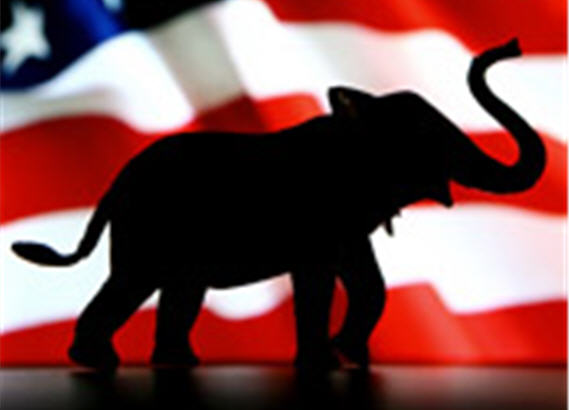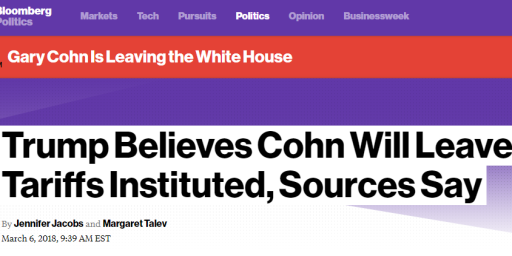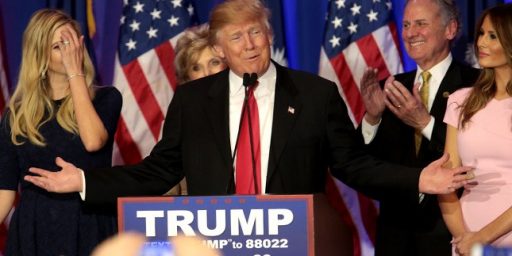Republican Primary Rules Favor Centrists
Why Republicans nominate moderates for president and not other offices.
538’s David Wasserman explains why far-right candidates lead the national polls but don’t win the Republican nomination.
There are plenty of reasons to be cautious of national polls that show Trump and Carson leading. They may fail to screen out casual voters, for instance, and leaders at this point in past years have eventually tanked. But perhaps the biggest reason to ditch stock in these polls is that they’re simulating a national vote that will never take place.
In reality, the GOP nominating contest will be decided by an intricate, state-by-state slog for the 2,472 delegates at stake between February and June. And thanks to the Republican National Committee’s allocation rules, the votes of “Blue Zone” Republicans — the more moderate GOP primary voters who live in Democratic-leaning states and congressional districts — could weigh more than those of more conservative voters who live in deeply red zones. Put another way: The Republican voters who will have little to no sway in the general election could have some of the most sway in the primary.
As The New York Times’ Nate Cohn astutely observed in January, Republicans in blue states hold surprising power in the GOP presidential primary process even though they are “all but extinct in Washington, since their candidates lose general elections to Democrats.” This explains why Republicans have selected relatively moderate presidential nominees while the party’s members in Congress have continued to veer right.
The key to this pattern: “Blue-state Republicans are less religious, more moderate and less rural than their red-state counterparts,” Cohn concluded after crunching Pew Research survey data. By Cohn’s math, Republicans in states that Obama won in 2012 were 15 percentage points likelier to support Romney in the 2012 primary and 9 points likelier to support McCain in 2008 than their red-state compatriots. Romney and McCain’s advantage in blue states made it “all but impossible for their more conservative challengers to win the nomination,” Cohn wrote.
How big is that advantage?
The electorate that nominates GOP presidential candidates is much bluer than the ones that nominate other GOP officials, a distinction that is almost impossible to overstate. Look at where the Republican Party lives: Only 11 of 54 GOP senators and 26 of 247 GOP representatives hail from Obama-won locales, but there are 1,247 delegates at stake in Obama-won states, compared with just 1,166 in Romney states.
What’s more, an imbalance lies in a nuance of the RNC’s delegate allocation. Although it can be a byzantine process, here are the basics: The RNC allows state parties some leeway in how to award delegates to candidates. In a few states, including Florida, Ohio and Arizona, the primary winner wins all the state’s delegates. In most others, delegates are allocated either proportionally to votes or by the winner in each congressional district.
A total of 832 delegates (about 34 percent of all 2,472 delegates) spanning 23 states will be awarded based on results at the congressional district level. Here’s the catch: According to the RNC’s allotment rules, three delegates are at stake in each district, regardless of the partisan lopsidedness of the seat. This creates a “rotten boroughs” phenomenon in which Blue Zone Republicans’ votes can be disproportionately valuable.
Presumably, this is not an accident. While rank-and-file Republicans might prefer to nominate the most conservative possible candidate, party leaders want to win elections. While it might make sense to run hard-right candidates in overwhelmingly Republican House districts and for state-wide office in the reddest of Red States, presidential elections are won by appealing to swing voters in the handful of states that are actually competitive. While the most conservative candidates make the Republican get-out-the-vote effort, the winner-take-all nature of the presidential election process makes GOTV irrelevant in all but a handful of states. It doesn’t really matter whether the Republican nominee wins Texas by 100,000 votes or a million. What matters is eking out a victory in Ohio, Florida, Virginia, Pennsylvania, Wisconsin, Colorado, and a couple of other states.
Donald Trump is something of an outlier here, in that he’s less ideologically definable than Rick Santorum, Mike Huckabee, or Ted Cruz. I’m not seeing enough state-level polling to know what his appeal is in blue states. Regardless, the process seems designed to weed out candidates who will scare off swing voters.







Donald Trump is without a doubt the least authentically conservative candidate in the Republican field. It cracks me up to see some of my friends call Jeb Bush or Marco Rubio “moderates”, while cheering on Trump as a conservative hero.
The fact is, the only true centrist in the Republican field is probably Chris Christie, and I don’t think anybody thinks he has much chance of getting nominated … not that it would matter. We’ve seen in the last two elections that even if Republicans do nominate relatively centrist candidates, their primary process forces those candidates to stake out positions that are not centrist at all. This time, perhaps they won’t mess around with a centrist who has to pretend to be conservative, and just go ahead and nominate the real deal. From this left-leaning Independent’s perspective, Marco Rubio is still the scariest potential nominee because he is a real deal conservative; but for some reason many people, including a lot the press view him as a “moderate”.
I think you may be giving too much design/intentionality credit here. Part of this is federalism and since we do things state by state there is going to be the mitigating factor that less conservative republicans in less conservative states are going to have a say. Part of it is also American lack of knowledge of electoral rules and anti-proportional representation sentiments (sentiments that are strong in the GOP than in the Democratic Party). The tendency toward district level plurality based allocation is also more conservative (in the sense of “that is way we do it in the US”).
There may be some attempt here to push out a particular kind of candidate, but I seriously think other factors are at play as per the above.
Todd,
I’d argue that John Kasich probably qualifies as “centrist” too, or at least closer to the center than many other people in the GOP field.
@Steven L. Taylor:
Can’t part of it also be attributed to the ways that the respective parties allocate delegates? Republicans are more likely to rely on winner-take-all primaries, whereas Democratic primaries are more likely to award delegates proportionally. This is one reason why the Clinton-Obama fight lasted as long as it did in 2008. During that year, even when Obama was coming in second to Clinton in big primary states such as California, New York, and Texas he was doing well enough to add to his delegate total in a way that made his eventual win more likely. Had Democrats used winner-take-all primaries that year, Clinton most likely would have won the nomination easily, although of course we can’t really say that for sure because the manner in which delegates were allocated obviously shaped the manner in which both candidates ran their campaigns.
@Doug Mataconis: True. Especially in today’s Republican party, Kasich does appear to be fairly centrist. But to be honest, I forgot he was even in the race. And really, can you imagine any scenario where he is the Republican nominee in 2016?
If he was the nominee, I’d personally probably feel somewhat like I did about Romney. It wouldn’t be a total disaster if he was elected President. But just like Romney, and McCain before him, hypothetical candidate Kasich would not be able to run as a centrist anyway. He would be forced to prove to conservatives that he could be “trusted” if elected … thus defeating the whole point of nominating a centrist in the first place.
@Todd:
Reg’d Kasich:
Not really, no. He’s performing better than expected in New Hampshire, but nowhere else. In that respect, he’s like 2016’s version of Jon Huntsman, although he has run a better campaign than Huntsman did.
@Doug Mataconis:
I see Kasich as on ‘old school’ non-slash-and-burn conservative. He’s not a binary all-or-nothing guy. He definitely wants conservative policies implemented, however he’s willing to negotiate a deal that gets him most of what he wants. And THAT doesn’t seem to cut it in today’s Republican Party.
I’ve previously considered Kasich to be a guy who could win a general election, now not so much. I think the new all-or-nothing types see Kasich a bit the way the see Romney – not a true conservative, too willing to make deals.
I think Rubio will be there at the end. He’s a bit Nixonian in that he really is a conservative, but he’s skillful at the game of politics. He’s laying back now – it’s really early – he will say what ever it takes to mollify the Tea-Freedom types. He has a lot of advantages, one of them being that he’s Cuban American, a reliably conservative Republican voting constituency. Plus, unlike Ted Cruz, he actually has desirable people skills.
@Doug Mataconis: That part of what I was getting at: the GOP is predisposed to the more straightforward winner-take-all (state and district level). Dems are more prone to experimentation and attitudinally more likely to prefer the fairness of PR allocation.
2008 does help illustrate my point, however, that a lot the implications of the rules are poorly understood even by the participants: Clinton’s team didn’t understand the CA rules and it bit them pretty hard as they pursued the wrong strategy.
@Todd: While I agree with you in terms of policy and ideology, the fact is that what constitutes “conservative” and “centrist” is pretty much whatever Republicans think they are. The most amazing thing is that I keep hearing Trump fans denounce the RINOs in their party. Their use of the term RINO says it all–these are the same people who flocked to Sarah Palin and Herman Cain. I haven’t seen a poll that does a demographic or ideological breakdown of the supporters, but I’d bet the Trumpists are largely Republicans who identify as “very conservative,” while Rubio and Bush supporters identify as moderate or somewhat conservative.
Policy isn’t half the story here.
@Kylopod: I wonder if Trump is thinking of pulling a Meiji Revolution. Running on one platform, then, when getting in, turning 180 degrees.
I think he’s having too much fun blowing up the Republican Establishment to be planning that far, however.
@Kylopod: Oh, I don’t doubt for a second that most of Trump’s supporters are true blue conservatives. But as I said in another comment a few days ago, Trump strikes me more as the type of salesman who is serving the kool aid rather than drinking too much of it himself.
@Todd: Your comment reminded me of the quote that conservatism at present is an attitude divorced from issues — or something like that. It dangled on the edge of my mind like one of my damned floaters teasing my vision.
Son of a gun! It was Steve Schmidt describing — ta dah! — Donald Trump.
“We’re at this moment in time when there’s this severability between conservatism and issues. Conservatism is now expressed as an emotional sentiment. That sentiment is contempt and anger.”
@Todd:
I actually very much doubt that. It all depends on how you define a “true blue conservative.” That’s my point.
To me, the most interesting thing about the Trump phenomenon is that it seems to have exposed something many of us suspected for years, which is that much of what we think of as the right wing of the GOP–the so-called “base”–is not in fact conservative in any traditional sense.
When Trump proposed taxing the rich, his high poll numbers didn’t budge. This led some commentators to suggest there was some untapped “populism” among some Republican voters. But then Trump released a thoroughly orthodox GOP tax plan strikingly similar to Jeb’s, and his poll numbers still didn’t budge. They didn’t budge when he attacked Obamacare, and they didn’t budge when he defended single-payer health care.
Doesn’t anyone realize by now that his supporters aren’t attuned to half the things he’s saying? All they care about is that he attacks brown people, and that he isn’t “politically correct.” It’s a primal roar. Isn’t that what they’ve always been about? It’s the “keep your government hands off my Medicare” crowd, where “small government” is nothing more than a buzzword for keeping the government from giving “free stuff” to those “other” people, as opposed to “real Americans.”
Left, right, and center just don’t mean what they used to.
@Kylopod:
I’m with Kylopod here. There’s very little conservative about what Trump supporters (and a lion’s share of the GOP base) want. Unfettered government spending is fine and dandy as long as it’s directed to the things they love like Medicare (not Medicaid!) and aircraft carriers. Government regulation is good too, as long is it reins in the perverts and not upstanding businesspeople.
@Scott F.:
Trump supporters have said that they’re okay with higher taxes, bigger government, more access to abortion, more government regulation, etc. in return for having all the Mexicans deported and the wall constructed. You know, the wall that Trump will make Mexico subsidize.
@Kylopod: I actually agree with you, modern day “conservatism”, at least at the (non-evangelical) grassroots level really doesn’t have all that much to do with policy. But anecdotally, based on the people I know who strongly support him, Trump’s groups of supporters line of fairly well with the type of people who start their day with Drudge, listen to Rush, Mark and Sean everyday, and are often more pissed off at the “RINOs” than they are the “muslim in chief”.
Trump appeals to them in the same way that the right-wing media stars do. It has little to do with “policy” and everything to do with “tone”.
@Scott F.:
Almost all this was the traditional meaning of “conservative” in perhaps every country outside US (look for the politics of Disraeli or Bismark, combining nationalism, strong support for the Queen or the Kaiser, and some, very specific, welfare measures; or the combination of social conservatism and “social market economy” of the European christian-democrats).
It is common to say that US-style “conservatism” is a very peculiar type of conservatism, much more libertarian/”free-market”/”small government” than the traditional European (specially continental) conservatism, much more statist and even authoritarian; but perhaps real US conservatives are after all no so different from European conservatives.
@Steven L. Taylor: Certainly much is just an artifact of federalism. But Democrats changed their rules after Jesse Jackson’s first run to move away from winner-take-all to a more proportional system that more accurately reflected the appeal of a Jesse Jackson. The Republicans have kept in place a system that seems to advantage relatively centrist candidates and would do it even moreso if they could enforce when states held their primary elections.
@James Joyner: My point is that I question to the degree to which the rules were kept by Republicans for the reasons you describe in an intentional way.
For that matter, I am not sure that the rules actually favor centrism as much as they penalize candidates with smaller levels of support and knock them out early in the process. Candidates with larger levels of support tend to be the ones with the more mass appeal in the party and hence the more establishments types for a bit more moderate than the true believers.
The current rules could very much favor a Carson or a Trump if they could, in fact, maintain the level of support they currently have and could do so consistently across various states.
Of course, the rules will knock out all the low performing more standard candidates allowing Rubio or Bush to challenge whichever of the entertainers are left in the challengers position.
@James Joyner: @Steven L. Taylor:
It’s also worth noting that, even after the changes the Democrats made to make delegate allocation more proportional, they changed the process further by making “Superdelegates” a more prominent part of the process as well. Many observers have argued that this was done in part to offset the potential impact of proportional allocation and avoid the likelihood of a brokered convention.
Republicans have “Superdelegates” too, but they are not as numerous and don’t play the same role in the nominating process.
@Todd:
Yeah, but the funny thing is that I always thought those folks were at forefront in enforcing the GOP’s economic orthodoxy. It was Rush and his successors who did more than anyone else to promote the cult of Reaganomics among the rank-and-file (as opposed to the elites).
Back in the 1990s, Rush at first became a strong supporter of Pat Buchanan in his primary challenge against the first President Bush for his heretical tax increases. Four years later, he turned against Buchanan for his attacks on free trade, calling him not a true conservative but a “populist” (something Rush has long used as a dirty word).
I recently asked a Limbaugh listener to explain why Rush was now promoting Trump, who has not only attacked free trade, but defended single payer and tax increases. The guy told me Rush has changed his mind on the trade issue. I suspect this is BS and Rush simply likes Trump because of his race-baiting and because he sees a fellow traveler in the world of professional trolldom, but not being a regular listener, I couldn’t say for sure.
In any case, one thing I do remember from the 1990s was that when Rush went after Buchanan, it invited something of a backlash among his listeners. I remember a cartoon from around the time in which Rush gets a call from someone shouting “Rush Limbaugh is a big fat idiot!” Rush replies, “Is this Al Franken?” Then the cartoon cuts to an image of the caller, who’s a guy in cowboy gear.
Probably all along a significant portion of his audience were reacting to the cultural-racial stuff and were never all that tuned into the economic stuff except as it applied to those “others” getting “free stuff.”
Any mass political movement is going to be difficult to define in a few words or observations. However, it is true that a significant component of conservativism is preservation of existing power structures. This feeds into the racial issues and the “political correctness” rallying cry.
@Steven L. Taylor:
I’d say it’s not just a significant component but the overwhelming majority. The differences lie in which power structures are being preserved. To the Chamber of Commerce crowd, what they’re aiming to protect is entrenched wealth. To the rank-and-file, it is the groups perceived to have the most cultural power traditionally: whites, males, Christians, straights. Either way, conservatives of all stripes perceive themselves as being under assault–of having power removed from them and being given to those “others” (non-rich, non-white, non-male, etc.). I am not implicating you, Steven, or any of the other OTB writers, but it is something I see among virtually all strands of American conservatism today, and the exceptions are few and far in between.